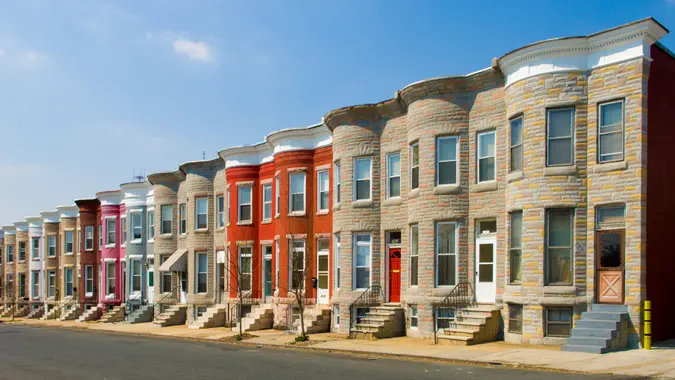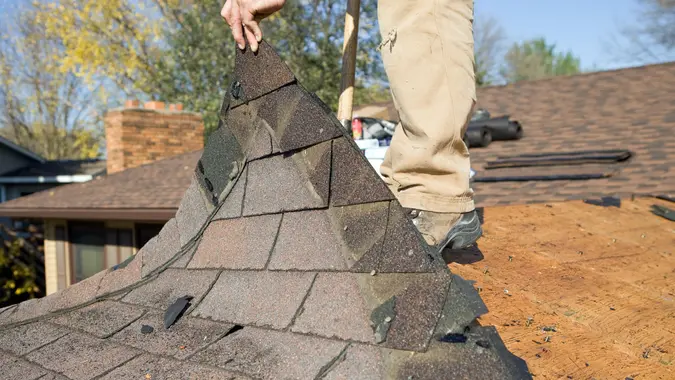This Is the Average Age Most Americans Become Mortgage-Free

Commitment to Our Readers
GOBankingRates' editorial team is committed to bringing you unbiased reviews and information. We use data-driven methodologies to evaluate financial products and services - our reviews and ratings are not influenced by advertisers. You can read more about our editorial guidelines and our products and services review methodology.

20 Years
Helping You Live Richer

Reviewed
by Experts

Trusted by
Millions of Readers
A mortgage is usually the biggest debt that Americans ever have, often amounting to hundreds of thousands of dollars. While that might seem like a lot of money to pay off — and it certainly can be — most mortgages don’t last longer than 30 years.
Depending on when you take out a mortgage, it often means that your house will be fully paid up before you retire. And if you’re one of the many diligent Americans who either take out a 15-year mortgage or make extra payments along the way on a standard 30-year, you may be mortgage-free even sooner.
However, while it’s generally a good idea to get out of this debt as fast as possible, as financial personalities like “Shark Tank” star Kevin O’Leary recommend, others suggest that you can be better off in the long run financially if you take your time. Here’s a look at the pros and cons of both positions, along with the average age that most Americans become mortgage-free.
Mortgage-Paying Habits of Average Americans
Trying to describe how “average Americans” pay down their mortgage is something of a fool’s errand. In addition to having different incomes, mortgages, and costs of living, each person’s payment habits are unique as well. However, there are some data points from reliable sources like the U.S. Census Bureau that can shed some light on the mortgage-paying habits of average Americans.
For example, according to the Census Bureau, fewer than 28% homeowners below retirement age have paid off their homes completely, as opposed to almost 63% of those 65 or older. That makes sense, of course, as older Americans have had a longer time to make payments.
But with nearly two-thirds of retirement-age Americans having paid off their mortgages, it means that the average age they have gotten rid of that debt is likely in their early 60s. Stats from 538.com, for example, suggest the age is around 63.
As each homeowner is unique, though, this type of information should only be used anecdotally. You should always stick with the financial plan that is tailored to your own objectives and personal situation.
O’Leary’s Take on Paying Down Mortgages
Kevin O’Leary is famous for being direct with his advice about saving and investing. The same is true when it comes to paying down your mortgage.
To O’Leary, debt is the enemy of any financial plan — even the so-called “good debt” of a mortgage. According to him, your best chance for long-term financial success lies in getting out from under your mortgage by age 45. This is because by O’Leary’s reckoning, most careers are halfway done by age 45.
“So, when you’re 45 years old, the game is more than half over, and you better be out of debt, because you’re going to use the rest of the innings in that game to accrue capital,” he said.
Under O’Leary’s plan, after you get out of debt by age 45, you can use the money that used to go to debt servicing — including paying your home mortgage — to ramp up your investments. After 15 or 20 years or accelerated investing, according to O’Leary, you should be in a much better place in terms of building a retirement nest egg.
Benefits of Taking Longer To Pay Down Your Mortgage
O’Leary’s advice is generally sound, and most advisors will recommend that you should get out of debt as soon as possible. But there are some situations in which taking longer to pay down your mortgage could actually put you ahead financially.
First, it’s important to realize that many Americans are not in the financial position to pay off their mortgage by age 45. Recent data indicates that the average age of a first-time homebuyer is now 36, the highest it has ever been. That only gives the average homeowner 9 years to pay off that mortgage, which is pretty unreasonable for most. Trying to stretch your budget to pay off a mortgage in less than a decade can make it very hard to cover all of your other expenses.
Beyond this is the fact that mathematically speaking, it may make sense to stick with a lower-rate mortgage and invest the difference. Imagine, for example, that your mortgage interest rate is just 4%. Rather than setting aside an additional $1,000 per month to pay off your mortgage fast, it may make sense to invest that $1,000 in a higher-rate option like the stock market, according to Ellevest’s Rachel Sanborn Lawrence.
Choosing the Best Path for You
Paying off your mortgage before you retire can remove a significant burden from your cash flow. This can afford you more expendable income during your golden years.
However, whether you should rush to pay off your mortgage before then or stick to its full 30-year schedule is a determination best made by analyzing your own personal financial situation, not by comparing yourself with the so-called “average American.”
 Written by
Written by  Edited by
Edited by 

























